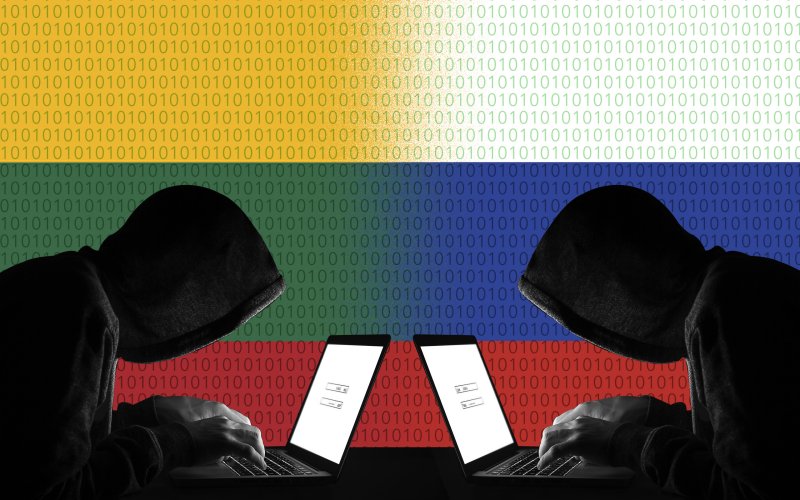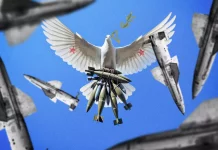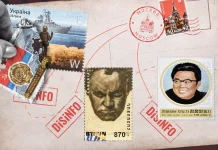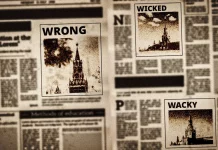
What at first looked like as a social media grudge match could be a precursor to invasion, war and resistance in the Baltics, Michail Weiss wrote for The Daily Beast.
Mindaugas is an unassuming, thirty-something advertising agency director by day, and a ferocious cyber-warrior by night. He started a phenomenon, here in Lithuania, of countering Kremlin propaganda and disinformation on the Internet. “We needed to call our group something. What to name it? Well, we were fighting trolls. So I said, ‘Let’s be elves.’”
There were 20 or 30 at first, when the trolls began a targeted campaign of leaving nasty comments about the Lithuania government and society, usually pegged to a hatred of NATO, the European Union and, of course, the United States. Since then, elves have proliferated into the hundreds. They’re now scattered about neighboring Latvia and Estonia and have even been spotted as far north as Finland. The elves pride themselves on clandestinity and reclusiveness, and so I was quite lucky to catch this Lithuanian Legolas on my last night in Vilnius.
“Most of us were already participating in some online groups,” said this man suggests we call him Mindaugas in person. “Fighting the trolls on Facebook and vKontakte, giving examples of Russian lies. That’s how we met.”
Facebook is where the light skirmishes take place; the mortal combat is reserved for the comment sections of Lithuanian news articles, where the trolls loose a constant drizzle of falsehoods and complaints, each comment helping to construct an alternate reality version of life in this Baltic country of three million. Rather than a thriving and patriotic post-Soviet success story, which it is, the image the trolls cultivate is that of a demoralized and angry society whose people are ready for regime change, be it through internal democratic mechanisms or through “liberation” by a friendly neighboring army.
No one knows how many trolls are polluting the Lithuanian media, or how many are actual human beings versus bots programmed with word algorithms that spew out permutations of the same anti or pro sentiment, or how many are single persons posing under different handles as multiple people, or how many are genuine provocateurs as opposed to salaried employees clocking in at one of many Russian troll farms, such as the well-reported Internet Research Agency in St. Petersburg. All that’s known for sure is that their messaging is relentless and consistent. Mindaugas, speaking ironically, summed up the broad themes: “We are Nazis. Our president is controlled by Obama. Our country is a puppet of the United States.”
The civic activists committed to knocking down this disinformation have grown steadily over the last 18 months. Their pushback is dogged but not dogmatic, Mindaugas insisted. “We don’t try to be propagandists in reverse. Lithuania has problems, of course, like any nation. We only want to expose the bullshit.”
Online armies, he believes, can only be met with opposing armies. Mindaugas goes by the online nom de guerre “Baltas” and his network has expanded to the point where the elves exercise a kind of virtual command-and-control to counteract particularly fierce troll offensives. He set up the online headquarters in a Google Group. Everyone could share information and target-scout the front lines of reader feedback sections. “We’d put in a link and all the members would go to it and leave their comments, liking, disliking, et cetera.”
A recent documentary made by Lithuanian filmmakers Martynas Starkus and Jonas Banys offered some remarkable insights into the cyber contingent against which Mindaugas is ranged. They interviewed Karolis Zukauskas, a Lithuanian public relations expert, who says he staged an experiment to see just how easy it was to recruit pro-Kremlin trolls for money. Zukauskas posted an advertisement on Facebook, adorning the job spec with Russian nationalist iconography. In under a day, he had six applicants, three of them with their own portfolios of hostile comments to bolster their chances of hire. And everyone wanted to be paid in euros, not rubles.
What’s also striking is that the Kremlin’s information war isn’t waged in any linear or chronological fashion; archival material is just as susceptible to attack as is recently published content. An article posted in 2011 at Delfi, a prominent news portal, about Lithuanian Special Forces’ deployment to Afghanistan suddenly became, in 2015, a cynosure for pro-Kremlin activity.
Some 613 comments were left under the piece, over 60 percent of them negative, although few rose above such Olympian geopolitical heights as: “Respect to Afghans for driving out occupants and mercenaries who came to kill and provoke hate between local people.” Or: “It should be called A-Team of America’s bootlickers. Balls out [sic] off Afghanistan.” An IP address analysis showed that more than a third of the 60 percent came from just four computers. This was four years after the original piece was published.
Sometimes the elves learn each other’s real names and meet up in person; more often, they remain unknown to each other, the better to avoid being infiltrated by the other side. “We do counterintelligence like any spies,” Mindaugas said, adding that professional diversity has greatly improved their technical savvy.
There are the IT specialists who came up with a bespoke chat software considered more secure than Google. There are psychologists adept at behavioral pattern recognition, by which similar online personae can be mapped, followed, and possibly doxxed. The objective, Mindaugas admitted, is to name names. “We are trying to figure out the identities of the trolls—at least locate the country or town they come from.” So far, they’ve had little success.
The Lithuanian Armed Forces eventually noticed the elves and were duly impressed. At a recent NATO summit in Riga, Lithuanian soldiers began explaining the elf phenomenon to their Latvian counterparts as a new breed of partisan resistance fighters for the 21st-century. Reports of this discussion leaked to the Baltic media, ironically making it a subject rife for meta-trolling and, one imagines, meta-elfing. It was, as Mindaugas put it, “a big shock” that the world’s largest military alliance had discovered his independent cabal of activists and saw them fit for discussion. Also a not altogether pleasant surprise, since the elves fear that too much scrutiny could scupper their most prized possession—anonymity.
A trend has caught on, making the daily workflow for the elves much lighter. “At the moment, for us, we have a pretty good situation because during this year and a half, our society has changed. We don’t need to go those comments that much anymore because ordinary people are now doing it themselves.”
***
Lithuania considers propaganda and disinformation — “active measures” in the old and suddenly new-again argot of Cold War tradecraft — a high-level national security threat. The country’s pugnacious president, Dalia Grybauskaite, referred to as the Baltic Iron Lady, has said that Lithuania is “already under attack” by Russia. “The most dangerous goal of information warfare,” Grybauskaite emailed me, “is to break the people’s will to resist and defend their state, and to create favorable environment for possible military intervention. And the example of Ukraine is proof that conventional war in Europe no longer is theoretical.”
It’s also meant that Lithuania is no longer taking any chances. The national defense budget was increased by 35 percent after Crimea. In March 2015, parliament voted almost unanimously to reintroduce conscription, a policy that had been suspended in 2008. And three months prior to that, Defense Minister Juozas Olekas issued a new handbook for schoolchildren, the military and general public titled, “How to Act in Extreme Situations or Instances of War.” It’s more or less a field manual for withstanding Russian invasion.
Many Lithuanians believe one is imminent; by the time I left Vilnius earlier this month, I nearly did myself. At a private briefing at the Lithuanian Defense Ministry’s Department of Strategic Communications—a department that, inter alia, anatomizes Kremlin messaging at a granular level, looking for patterns, plots or signposts that may suggest a hot confrontation is near—I had the three audiences of Kremlin infowar explained to me:
First are the populations of foreign countries, whose histories are distorted and the health of whose political systems are consistently questioned, all in order to push them into a pro-Moscow orientation.
The second audience is NATO and the European Union, the dual bugbear institutions that Russia has inflated into sinister global conspirators and would very much like to see dismantled, starting with those member states in its immediate western periphery.
Finally, Russia goes after its own people, convincing them that, should it come to war with one of the “fascist” neighbors, it will definitionally be a just and defensive one.
In April 2015, the Center of Systematic Analysis and Forecast, a think tank close to the Russian government, issued a report written by the Center’s head, Rostislav Ischenko. Titled “On the Necessity of the Preventive Occupation of the Baltic Region,” it laid out the circumstances under which Moscow and Belarus might be obliged to conquer the three former Soviet-occupied countries on their western periphery.
The casus belli in this rendering would be a forthcoming or likely act of NATO aggression, an invasion of Russia launched from Estonia, Latvia and Lithuania. For the last year, Russian state-run media organs have portrayed such a NATO invasion as inevitable, with some even naming the year it’s set to commence as 2020. (The documentary on Russian propaganda directed by Martynas Starkus and Jonas Banys was called “War 2020.”)
Thus the “necessity” for a preemptive strike on these countries, Ischenko writes, “arises not only because of the threat of the invasion but also as a means to shorten the possible front line in case of need… The overwhelming blow at the Baltic region is necessary in order to eliminate danger to the northern wing of Russia’s and Belorussia’s armed forces.”
Preventive war would also stop a concomitant NATO blockade of Kaliningrad, the Russian exclave, which shares a border with Lithuania. The Kremlin has lately threatened to deploy Iskander nuclear missiles to this non-contiguous oblast in the heart of Eastern Europe, and to occupied Crimea, for the possible annihilation of Warsaw and other NATO capitals. “In case we are successful in preserving our current positions,” Ischenko continues, “pro-Russian political forces could be placed into power in all Baltic states, in the context of downfall of NATO, [and] it would be possible to achieve a special status providing Russia with the role of guardian of these countries.”
Without overstating the likelihood of a Russian assault on the Baltics, Jānis Kažociņš, the former head of Latvia’s Constitutional Protection Bureau, one of the country’s intelligence services, has noted ominously that all three Baltic states share a 932-mile border with Russia and Belarus, where Russian troops are garrisoned. The border they share with their nearest NATO partner, Poland, is just 64 miles long.
Ischenko’s dire military forecasting, which really would usher in World War III, combines in the open source realm with Russia’s expansive “compatriots” policy. It is now a matter of strategic doctrine that ethnic kin and Russian language speakers living within or without the borders the Russian Federation can be defended by force, irrespective of another country’s sovereignty. This policy, a kind of tribalist answer to the “Right to Protect” norm, was the pretext for the annexation of Crimea two years ago.
The story here is by now widely known: a Nazi junta had seized power in Kiev in a U.S.-underwritten coup, ousting the legitimate President Viktor Yanukovych and waging pogroms against ethnic Russians, Jews and other minorities. In mortal danger of arrest, dispossession or extermination, they required urgent humanitarian intervention and fortunately it arrived just in time. At first, those coming to the rescue were depicted by Moscow as mere “volunteers”—“little green men” with assault and sniper rifles and insignia-less uniforms—who mobilized to seize full control of the peninsula within 24 hours.
Putin later admitted that Russian conventional forces, mainly those that had already been garrisoned in Crimea under a preexisting treaty with Ukraine, but added to by incoming Special Forces and intelligence officers, did indeed stage a near-bloodless takeover of European soil. But rather than an Anschluss, Putin cast this act of aggression in a purely defensive light. (Hitler had done much the same thing in the Sudetenland of Czechoslovakia in 1938.) This physical siege was both preceded and accompanied by a psychological one.
“During the so-called referendum in Crimea, we sent our ambassador there,” Lithuania’s Foreign Minister Linas Linkevičius told me during the course of a 45-minute interview in his office. “It was not easy for him to get in. But he stayed for some time, and met locals…Tatars, also ethnic Russians, elderly people. They were scared that bandits and fascists were coming from Kiev to kill them. They were so happy to see Russian soldiers liberate them.”
And now, Linkevičius said, the same messaging campaign has started in the Baltics.
Over the last 18 months, Russian state media have alleged falsely that Lithuanian Special Forces kidnapped six Russian children in order to coerce their parents into collaborating against Russia, and that Latvia has erected concentration camps for ethnic Russians.
According to Lithuanian military officials who study and anatomize pro-Kremlin propaganda, Putin’s compatriots policy is promiscuous enough to encompass anyone born within the former boundaries of the Soviet Union or the prior czarist imperium. “Even Alaska,” one defense official told me, straight-faced.
No doubt this expansive definition owes to the variable quotient of ethnic Russians in Moscow’s self-arrogated sphere of influence. The population of them in Lithuanian is a mere six percent of the total, less than in Estonia and Latvia. Yet 8 percent of polled Lithuanians say they supported the annexation of Crimea. Most Lithuanians speak Russian. It’s typically the first tongue you’ll hear when you arrive in the capital.
Some 97 percent of the people watch television every day; of that figure, 14 percent are glued to Russian stations, many of which are actually registered in European countries and therefore beholden to EU regulations on broadcasting. Russian TV watchers are common among the older generations of Lithuanians who grew up with Soviet media are more comfortable being misinformed and entertained in their primary tongue. Tomas Kvedaras, a press attache at the Lithuanian Foreign Ministry, said his 85-year-old grandmother still prefers NTV or Channel One to any Lithuanian-language station.
Whether it’s funhouse mirror distortions of pre-Soviet national past, emotionally manipulated nostalgia for a glorious never-was of communism, or barely recognizable caricatures of contemporary politics, Kremlin active measure have got you covered.
As Foreign Minister Linkevičius put it, “lies are not alternative points of view,” and the country has enacted punitive measures against outlets that go too far.
Not without controversy. In April 2015, Lithuania’s Radio and Television Commission decided to suspend the broadcast license for the Russian TV channel RTR Planeta, which is registered in Sweden, for three months for transmitting “propagation of violence and instigation of war,” as commission member Mantas Martisius justified it. “This was done in accordance with European law,” Linkevičius said, “but there was a big noise, believe me. They accused us of censorship. They violated fair practices for broadcasting. They were instigating terrorism, war, hatred, xenophobia and glorifying the actions of Russian separatist groups. Vladimir Zhirinovsky called for the tanks to roll into Ukraine. Even into Brussels. He’s deputy chairman of Duma,” the lower chamber of Russia’s parliament. “So these threats cannot be taken lightly.”
***
During three days in Vilnius, I interviewed journalists, activists and government officials. Almost everyone told me (usually off the record) that if little green men stole across the border from Kaliningrad or Belarus, they wondered if NATO—and by that most meant the United States—really would defend Lithuania and risk a shooting war with Russia? And how would that even start, when the instigator of that war would plausibly deny being a party to it? Moscow disclaims any role in the ongoing violence in the Donbas, while Putin presents himself at Minsk as the separatists’ interlocutor for “cease-fires” and a lasting political settlement. This Monty Python satire on geopolitics is precisely what has the Balts worried. Tanks roll across borders, while their owners pretend not to know how they got there.
Most analysts point to an article written by Valery Gerasimov, the chairman of the Russian General Staff, in Voyenno-Promyshlennyy Kurier, or the Military-Industrial Courier, which hardly anyone read when it was published in February 2013. Now, however, the article becomes a secret decoder ring for understanding Russia’s supposedly innovative means of waging what’s variously been termed “hybrid” or “non-linear” or (God help us) “postmodern” warfare.
Gerasimov’s lead no doubt contributed much to the cult-like status his essay has lately attained in Western military circles:
“In the 21st century, we have seen a tendency toward blurring the lines between the states of war and peace,” he opens, somewhat grandiosely. “Wars are no longer declared and, having begun, proceed according to an unfamiliar template.” That template consists of the “use of special-operations forces and internal opposition to create a permanently operating front through the entire territory of the enemy state, as well as informational actions, devices, and means that are constantly being perfected.”
As much an act of theatre as one of aggression, what Gerasimov is selling here is in no way new. Stalin, for starters, established his puppet regimes in Europe even before the definitive close of World War II in much the same manner.
Ironically, though, Gerasimov’s template wasn’t Russian at all; he was outlining what he perceives as the American way of war in the 21st century. He has in mind not only the US-led interventions in Kosovo, Iraq, and Libya but the seemingly spontaneous “color revolutions” in Europe, as well as the recent Arab Spring uprisings, which, Gerasimov insists, are all U.S.-made conspiracies.
The Kremlin continues to believe that anywhere in the world democratic or anti-authoritarian convulsions occur, the electrical current is being supplied by spooks, State Department grant-writers, Delta Force and long-cultivated fifth columns.
“Instead of an overt military invasion, the first volleys of a U.S. attack come from the installment of a political opposition through state propaganda (e.g., CNN, BBC), the Internet and social media, and nongovernmental organizations (NGOs),” explains Charles K. Bartles, an analyst at the Foreign Military Studies Office at Fort Leavenworth, who has offered the best exegesis of Gerasimov to date. “After successfully instilling political dissent, separatism, and/or social strife, the legitimate government has increasing difficulty maintaining order. As the security situation deteriorates, separatist movements can be stoked and strengthened, and undeclared special operations, conventional, and private military forces (defense contractors) can be introduced to battle the government and cause further havoc.”
In other words, by sacking Crimea and waging a recondite invasion of the Donbas, Putin was only replicating what he thinks Clinton, Bush and Obama have done for the last 20 years. Or at least this is what Putin and his General Staff would like the West to believe is now their operative paradigm and motivation for waging dirty wars abroad.
Mindaugas painted a scenario which sounded like a Baltic remake of Red Dawn—without the happy ending. “Russian hunters or sportsmen from Latvia come to Lithuanian through the Schengen border. They take a small town hostage. Let’s say it’s Visaginas, which is a little bit north of Vilnius. This is where an old Soviet nuclear plant is. Almost all the town is Russian. So they declare the ‘independent republic of Visaginas.’ You don’t need a majority in this town to make a revolution; 50 or 100 people, well organized, can do it. So then what happens? Lithuanian police, the army, are sent in to retake the town. Russian media goes crazy showing the ‘fascist coup regime’ at its worst, shooting Russians. Suddenly 50 to 100 people becomes 1,000 to 5,000 soldiers who arrive as if from nowhere with APCs and BUKs. The rest you can imagine because you’ve seen it already in Ukraine.”
Lately, Mindaugas said, and he and the other elves have begun venturing out beyond cyberspace to do battle in the streets with the provocateurs they believe are going to lead the above-described occupation of Lithuanian territory.
Pro-Russian protests are an increasingly common occurrence in Vilnius, organized by strange groups with uncertain financial backing. All of the same themes popular online are regurgitated among the placard-wielding activists who position themselves in front of the U.S. embassy or the presidential palace to denounce the hydra-headed beast of America, NATO and the EU.
The result is always the same: a public disruption that is invariably filmed by Russian media outlets and published or broadcast back in Russia as a purported slice of Lithuanian public opinion. “The latest trend is refugees,” Mindaugas said, echoing what other European countries, especially Germany, have lately experienced. “Pro-Russian people and Lithuanian nationalists are teaming up against Arabs.”
At this I couldn’t help but laugh because to date Lithuania has only taken in six Syrian refugees, although government officials have told me that they’d gladly welcome more. “Today only six, tomorrow thousands,” Mindaugas said. “They are trying to arrange referenda against refugees, to keep them out.”
So, against the trolls’ street theater the elves have assembled to stage their own guerrilla counter-demos, photobombing the other side by draping themselves in American or EU flags, with big smiles on their faces. It means more work for the cameramen in Vilnius and the post-production editors in Moscow to get the requisite shot just right.
Crashing the troll parties carries the predictable risk that the elves are being watched and identified, for future harassment—or worse. “Fake reporters are filming, making photos of protesters from our side, placing those photos on Internet, asking for people’s help to identify us. They’ve asked for help from the Russian embassy.”
This is why, Mindaugas said, he asked me to use a fake name for him in this story. The next phase of protests, he fears, won’t be peaceful. “I think they will try to provoke violence, using the same methods they have used in Ukraine. I bought a gun. I’m learning tactics. If needed, we, all of us, will protect our houses not only with words, but also with guns.” He plans to join the Lithuanian army reserve, as do a lot of his friends, elves or not.
“NATO, the EU? So what?” Mindaugas said. “We should prepare to fight for ourselves, protect ourselves. We need to become Baltic Israel very fast. A small country with a small territory to fight with big, unfriendly neighbors.”
By Michail Weiss, The Daily Beast





